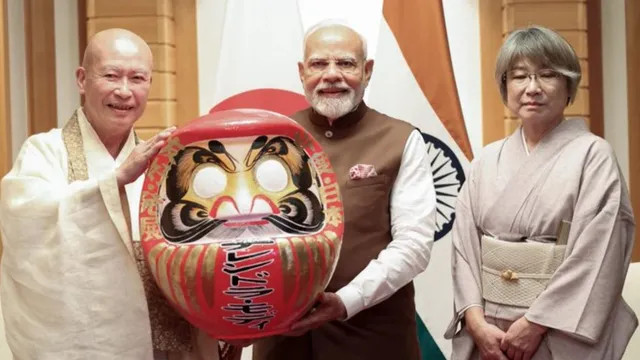- By Supratik Das
- Fri, 29 Aug 2025 03:28 PM (IST)
- Source:JND
PM Modi Japan visit 2025: Prime Minister Narendra Modi, who is on a two-day official visit to Japan from August 29-30 to attend the 15th India-Japan Annual Summit, was presented with a traditional Daruma doll during a ceremonial exchange. Chief Priest of Shorinzan Daruma-Ji Temple presented the Daruma Doll to PM Modi. The gift holds not only cultural significance in Japan but also traces its spiritual roots back to India, making the gesture deeply symbolic.
What Is Daruma Doll?
A Daruma doll is one of Japan’s most recognisable cultural icons. Round, hollow, and usually painted red, it has a stern face but no arms or legs. The figure represents Bodhidharma, the Indian monk credited with founding Zen Buddhism in the 5th-6th century. The design of the doll reflects the belief that Bodhidharma meditated for so long that he lost the use of his limbs. It is also made to return upright whenever knocked down, embodying resilience and perseverance. In Japanese homes and temples, the Daruma is considered a powerful symbol of good luck and determination.
#WATCH | Tokyo | Chief Priest of Shorinzan Daruma-Ji Temple presents Daruma Doll to PM Modi
— ANI (@ANI) August 29, 2025
(Video source: ANI/DD) pic.twitter.com/m4alaRQBMZ
According to Japanese tradition, when a person sets a goal or makes a wish, they buy a Daruma doll and paint one of its eyes. Once the goal is fulfilled, the second eye is painted to mark success. This practice has made Daruma dolls popular during New Year celebrations and milestones in personal and professional life. The dolls are most famously produced in Takasaki, Gunma Prefecture, where craftsmen have been making them for over two centuries. At the end of the year, old Daruma dolls are returned to temples for a ritual burning ceremony known as Daruma Kuyo, honouring past efforts and inspiring fresh beginnings.
The Indian Connection: Bodhidharma’s Legacy
The cultural link between India and Japan is clear in the origins of the Daruma doll. Bodhidharma, thought to have been born in Kanchipuram, Tamil Nadu, traveled to China in the 5th century to share the Buddhist way of life. His teachings led to the development of Chan Buddhism in China, which later transformed into Zen Buddhism in Japan. The tale of his long meditation inspired the self-righting design of the Daruma doll. This design reflects the Japanese proverb “Nanakorobiyaoki,” which means “fall down seven times, get up eight.”
The presentation of the Daruma doll to Prime Minister Modi conveyed a message of trust and respect. In Japanese tradition, giving a Daruma doll represents confidence in someone’s determination to reach their goals. By presenting this symbolic gift, Japan showed goodwill and wished for Modi’s success and stronger India-Japan relations. The selection of the Daruma was especially significant due to its Indian roots, emphasizing the long-standing spiritual and cultural ties between the two countries.
The Daruma doll gifted to PM Modi was not just a cultural artefact but a symbol of shared resilience and determination. Rooted in India’s Buddhist heritage and embraced in Japanese tradition, the gesture reinforced how spiritual history continues to shape modern diplomacy.

